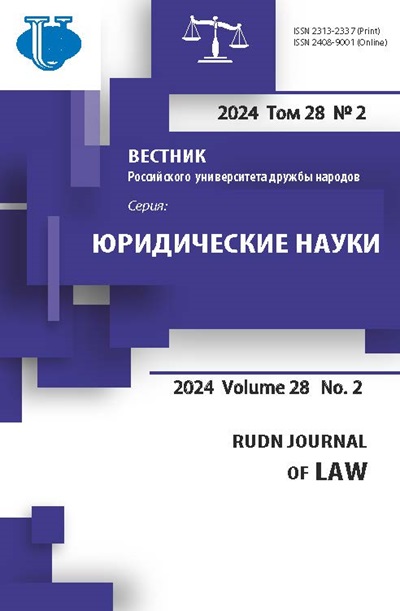Emile Durkheim’s social research in the context of human rights activism
- Authors: Kucherenko P.A.1, Nazarshoev F.K.1
-
Affiliations:
- RUDN University
- Issue: Vol 28, No 2 (2024)
- Pages: 360-377
- Section: HISTORICAL AND LEGAL RESEARC
- URL: https://journals.rudn.ru/law/article/view/39495
- DOI: https://doi.org/10.22363/2313-2337-2024-28-2-360-377
- EDN: https://elibrary.ru/JTNRVL
- ID: 39495
Cite item
Abstract
This article provides an analysis of the fundamental categories of Emile Durkheim’s theory within the framework of his methodology for social research and the phenomenon of human rights activism. It examines categories such as “social fact”, “solidarity”, “collective consciousness”, and “anomie” in the context of human rights activities. A distinctive feature of the article is its interdisciplinary approach, integrating sociological research results into the field of jurisprudence. The article explores a range of works by the French sociologist and philosopher Emile Durkheim, as well as relevant works by other philosophers, along with the contribution of contemporary Russian legal scholars within the aforementioned context. Given the growing demand for works on human rights issues in both Russian and global legal science, the authors conclude that a comprehensive understanding of the nature of individual rights and legal violations facilitates their more effective, profound, and systematic protection, not only in a reactionary sense, but also by enabling a preventive function in human rights activism. In this regard, the acquired sociological and legal knowledge seems pertinent, sought after, and can be utilized in subsequent doctrinal developments.
About the authors
Petr A. Kucherenko
RUDN University
Email: 1142220440@rudn.ru
Doctor of Legal Sciences, head of the Department of the Judiciary, Civil Society and Law Enforcement, Law Institute 6 Miklukho-Maklaya str., Moscow, 117198, Russian Federation
Firuzsho K. Nazarshoev
RUDN University
Author for correspondence.
Email: 1142220440@rudn.ru
Department of the Judiciary, Civil Society and Law Enforcement, Law Institute 6 Miklukho-Maklaya str., Moscow, 117198, Russian Federation
References
- Aznagulova, G.M. & Pashentsev, D.A. (2023) Issues of the theory of state in modern legal doctrine. Journal of Russian Law. 27(10), 5-15. https://doi.org/10.61205/jrp.2023.111 (in Russian).
- Volkov, Yu.G., Dobrenkov, V.I., Nechipurenko, V.N. & Popov, A.V. (2004) Sociology. Moscow, Gardariki Publ. (in Russian).
- Besnard, Ph. (1993) Anomie and fatalism in Durkheim's theory of regulation. In: Stephen P. Turner (ed.). Emile Durkheim: Sociologist and Moralist. Routledge. pp. 169-190.
- Chechelnitsky, I.V. (2023) Human rights activities classification. Aktual’nye problemy rossijskogo prava. 18(7), 27-41. https://doi.org/10.17803/1994-1471.2023.152.7.027-041 (in Russian).
- Chegovadze, L.A. (2023) About the subject of civil law regulation. Civilist. (2), 31-38. (in Russian).
- Durkheim, E. (1893) De la division du travail social. Etude sur l’organisation des sociétés supérieures. Paris, Felix Alcan.
- Durkheim, E. (1897) Le suicide: étude de sociologie. Paris, Felix Alcan.
- Durkheim, E. (1919) Les Régles de la méthode sociologique. Septiéme edition. Paris, Felix Alcan.
- Durkheim, E. (1990) On the division of social labor. Method of sociology. Translation from French and after. by L.B. Hoffman. Moscow, Nauka Publ. (in Russian).
- Durkheim, E. (1912) Les formes élémentaires de la vie religieuse. Le système totémique en Australie. Paris, Felix Alcan.
- Fukuyama, Fr. (1992) The End of History and the Last Man. N.Y., Free Press.
- Grear, A. (2010) Corporate Human Rights?. In: Redirecting Human Rights. Global Ethics Series. Palgrave Macmillan, London. https://doi.org/10.1057/9780230274631_3. pp. 23-39.
- Ignatchenko, I.V. (2018) Adolphe Thiers - the executioner of the commune of Paris, or “savior” of France? Evolution of assessments of the French liberal politician of XIXth century. Free thought. 5(1671), 173-184. (in Russian).
- Isiksel, T. (2019) Corporate Human Rights Claims under the ECHR. The Georgetown Journal of Law & Public Policy. (17), 979-1005.
- Kasatkin, S.N. (2022) Thesis of Judicial Discretioninthe Debate between R. Dworkin and Positivists: Arguments of the ‘Later’ H. Hart. Vestnik Permskogo universiteta. Juridicheskie nauki - Perm University Herald. Juridical Sciences. (57), 372-398. https://doi.org/10.17072/1995-4190-2022-57-372-398 (in Russian).
- Kucherenko, P.A. (2011) Representative and executive power: the problem of correlation in a modern state (comparative legal research). Diss. of Doctor of Legal Sciences. Moscow, Peoples' Friendship University of Russia. (in Russian).
- Kulick, A. (2021) Corporate Human Rights? The European Journal of International Law. 32(2), 537-569. https://doi.org/10.1093/ejil/chab040
- Le Bon, G. (1895) Psychologie des foules. Paris, Felix Alcan.
- Lunev, A.A. (2023) Fundamental rights of corporations in the international human rights system. Russian Juridical Journal. 4(151), 32-41. https://doi.org/10.34076/20713797_2023_4_32 (in Russian).
- Marx, K. (1895) Manifeste du parti communiste [1848]. Bibebook.
- Posadkova, M. (2022) The future has arrived: the constitutional nature of a right of access to reproductive and genetic technologies. Sravnitel’noe konstitutsionnoe obozrenie. 6(151), 72-94. https://doi.org/10.21128/1812-7126-2022-6-72-94 (in Russian).
- Shpakovsky, Yu.G. & Zhavoronkova, N.G. (2023) Environmental Lawmaking as Part of Social Planning. Actual Problems of Russian Law. 18(6), 142-157. https://doi.org/10.17803/1994-1471.2023.151.6.142-157 (in Russian).
- Sprondel, W.M. (2003) Solidarität. Grunbegriffe der Soziologie. Hrsg. von B. Schäfers. 8-te Aufl. Opladen: Leske+Budrich.
- Steiner, Ph. (2005) La sociologie de Durkheim [1994]. Paris, Edition La Découverte.
- Stepina, N.A. & Stepin, A.B. (2022) Medical malpractice: issues of theory and practice. Medical Law. № 4. pp. 52-56. (in Russian).
- Tarde, G. (1903) The Laws of Imitation [1890]. Translated by E.C. Parsons. N.Y., Henry Holt and Company.
Supplementary files















